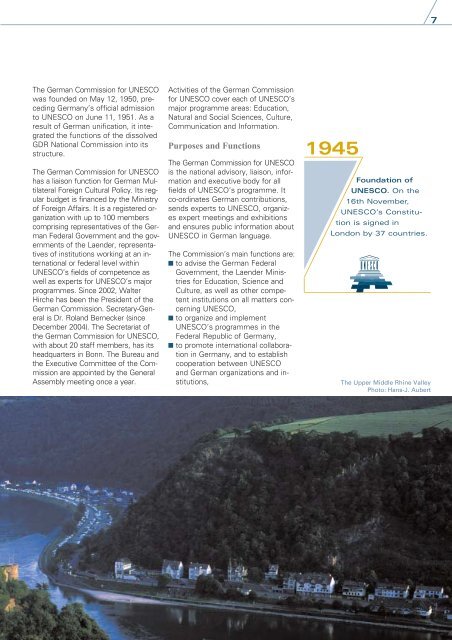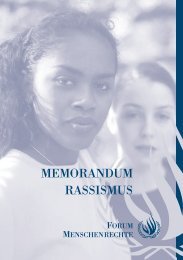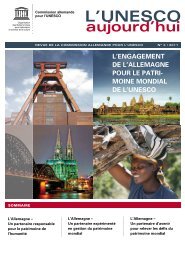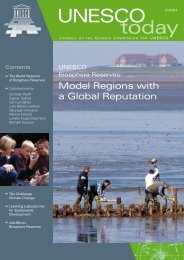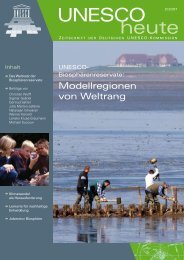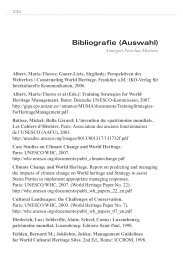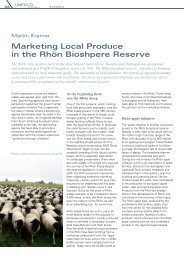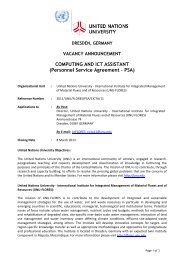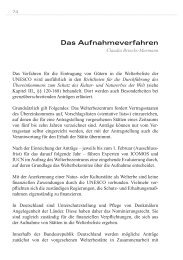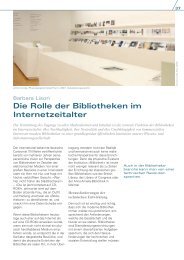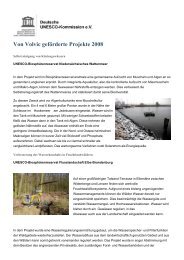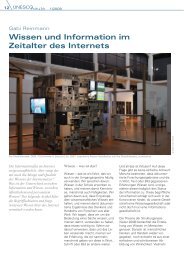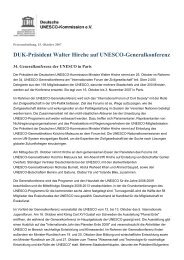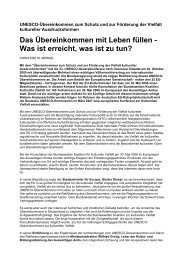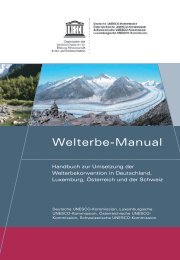Download - UNESCO Deutschland
Download - UNESCO Deutschland
Download - UNESCO Deutschland
Create successful ePaper yourself
Turn your PDF publications into a flip-book with our unique Google optimized e-Paper software.
The German Commission for <strong>UNESCO</strong><br />
was founded on May 12, 1950, preceding<br />
Germany’s official admission<br />
to <strong>UNESCO</strong> on June 11, 1951. As a<br />
result of German unification, it integrated<br />
the functions of the dissolved<br />
GDR National Commission into its<br />
structure.<br />
The German Commission for <strong>UNESCO</strong><br />
has a liaison function for German Multilateral<br />
Foreign Cultural Policy. Its regular<br />
budget is financed by the Ministry<br />
of Foreign Affairs. It is a registered organization<br />
with up to 100 members<br />
comprising representatives of the German<br />
Federal Government and the governments<br />
of the Laender, representatives<br />
of institutions working at an international<br />
or federal level within<br />
<strong>UNESCO</strong>’s fields of competence as<br />
well as experts for <strong>UNESCO</strong>’s major<br />
programmes. Since 2002, Walter<br />
Hirche has been the President of the<br />
German Commission. Secretary-General<br />
is Dr. Roland Bernecker (since<br />
December 2004). The Secretariat of<br />
the German Commission for <strong>UNESCO</strong>,<br />
with about 20 staff members, has its<br />
headquarters in Bonn. The Bureau and<br />
the Executive Committee of the Commission<br />
are appointed by the General<br />
Assembly meeting once a year.<br />
Activities of the German Commission<br />
for <strong>UNESCO</strong> cover each of <strong>UNESCO</strong>’s<br />
major programme areas: Education,<br />
Natural and Social Sciences, Culture,<br />
Communication and Information.<br />
Purposes and Functions<br />
The German Commission for <strong>UNESCO</strong><br />
is the national advisory, liaison, information<br />
and executive body for all<br />
fields of <strong>UNESCO</strong>’s programme. It<br />
co-ordinates German contributions,<br />
sends experts to <strong>UNESCO</strong>, organizes<br />
expert meetings and exhibitions<br />
and ensures public information about<br />
<strong>UNESCO</strong> in German language.<br />
The Commission’s main functions are:<br />
■ to advise the German Federal<br />
Government, the Laender Ministries<br />
for Education, Science and<br />
Culture, as well as other competent<br />
institutions on all matters concerning<br />
<strong>UNESCO</strong>,<br />
■ to organize and implement<br />
<strong>UNESCO</strong>’s programmes in the<br />
Federal Republic of Germany,<br />
■ to promote international collaboration<br />
in Germany, and to establish<br />
cooperation between <strong>UNESCO</strong><br />
and German organizations and institutions,<br />
1945<br />
Foundation of<br />
<strong>UNESCO</strong>. On the<br />
16th November,<br />
<strong>UNESCO</strong>’s Constitution<br />
is signed in<br />
London by 37 countries.<br />
The Upper Middle Rhine Valley<br />
Photo: Hans-J. Aubert<br />
7


